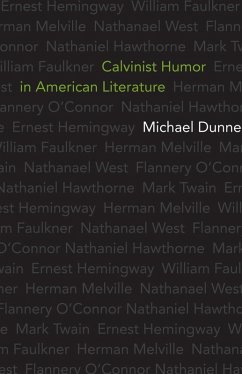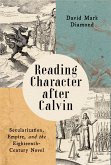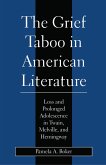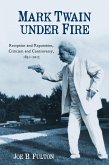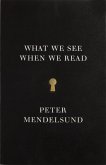Though the phrase "Calvinist humor" may seem to be an oxymoron, Michael Dunne, in highly original and unfailingly interesting readings of major American fiction writers, uncovers and traces two recurrent strands of Calvinist humor descending from Puritan times far into the twentieth century. Calvinist doctrine views mankind as fallen, apt to engage in any number of imperfect behaviors. Calvinist humor, Dunne explains, consists in the perception of this imperfection. When we perceive that only others are imperfect, we participate in the form of Calvinist humor preferred by William Bradford and Nathanael West. When we perceive that others are imperfect, as we all are, we participate in the form preferred by Mark Twain and William Faulkner, for example. Either by noting their characters' inferiority or by observing ways in which we are all far from perfect, Dunne observes, American writers have found much to laugh about and many occasions for Calvinist humor.
The two strains of Calvinist humor are alike in making the faults of others more important than their virtues. They differ in terms of what we might think of as the writer/perceiver's disposition: his or her willingness to recognize the same faults in him- or herself. In addition to Bradford, West, Twain and Faulkner, Dunne discovers Calvinist humor in the works of Flannery O'Connor, Herman Melville, Nathaniel Hawthorne, Ernest Hemingway, and many others. For these authors, the world -- and thus their fiction -- is populated with flawed creatures. Even after belief in orthodox Calvinism diminished in the twentieth century, Dunne discovers, American writers continued to mine these veins, irrespective of the authors' religious affiliations -- or lack of them. Dunne notes that even when these writers fail to accept the Calvinist view wholeheartedly, they still have a tendency to see some version of Calvinism as more attractive than an optimistic, idealistic view of life.
With an eye for the telling detail and a wry humor of his own, Dunne clearly demonstrates that the fundamental Calvinist assumption -- that human beings are fallen from some putatively better state -- has had a surprising, lingering presence in American literature.
The two strains of Calvinist humor are alike in making the faults of others more important than their virtues. They differ in terms of what we might think of as the writer/perceiver's disposition: his or her willingness to recognize the same faults in him- or herself. In addition to Bradford, West, Twain and Faulkner, Dunne discovers Calvinist humor in the works of Flannery O'Connor, Herman Melville, Nathaniel Hawthorne, Ernest Hemingway, and many others. For these authors, the world -- and thus their fiction -- is populated with flawed creatures. Even after belief in orthodox Calvinism diminished in the twentieth century, Dunne discovers, American writers continued to mine these veins, irrespective of the authors' religious affiliations -- or lack of them. Dunne notes that even when these writers fail to accept the Calvinist view wholeheartedly, they still have a tendency to see some version of Calvinism as more attractive than an optimistic, idealistic view of life.
With an eye for the telling detail and a wry humor of his own, Dunne clearly demonstrates that the fundamental Calvinist assumption -- that human beings are fallen from some putatively better state -- has had a surprising, lingering presence in American literature.
Dieser Download kann aus rechtlichen Gründen nur mit Rechnungsadresse in A, D ausgeliefert werden.

